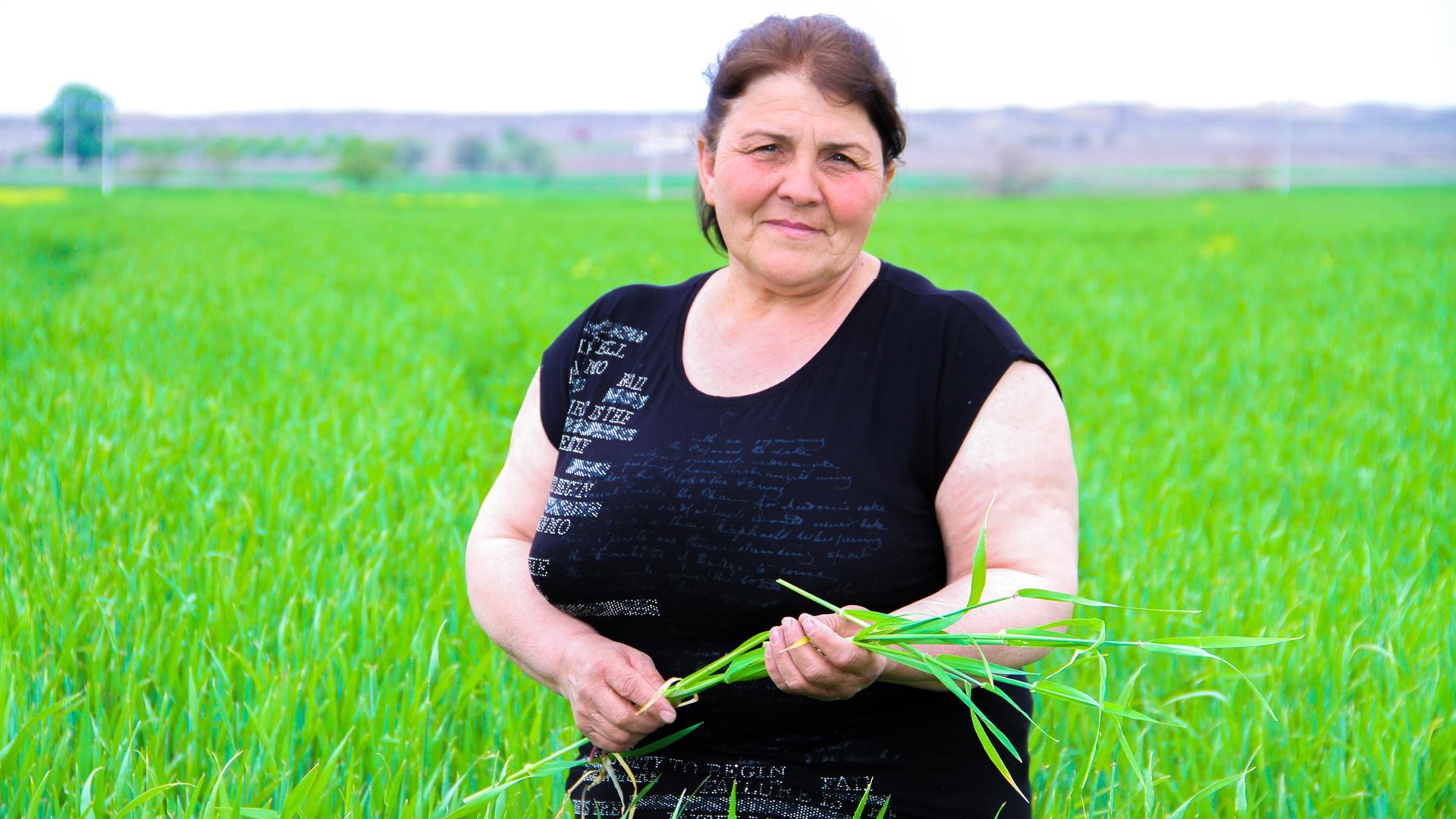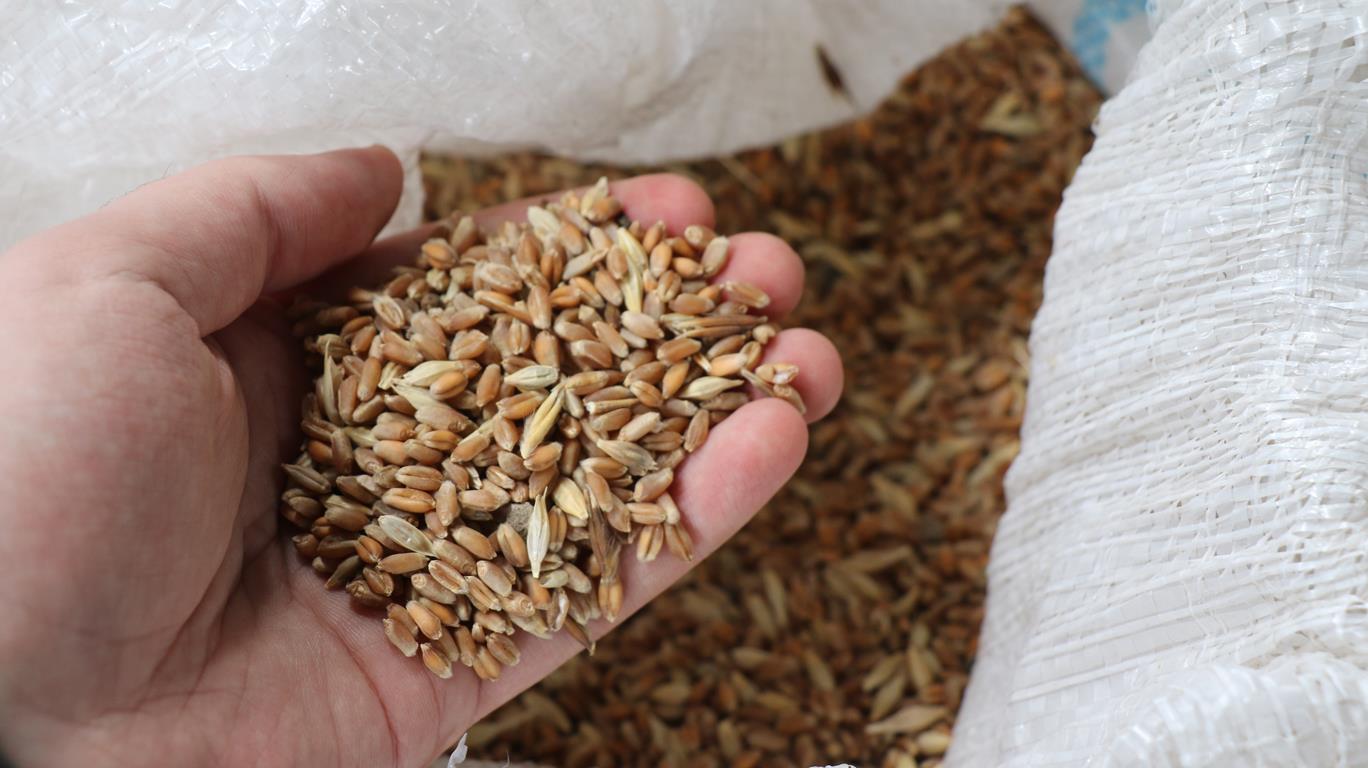
A mentor for women farmers in Azerbaijan
Connecting women and improving livelihoods through training and support from experienced peers
Olga Babayeva is an Azerbaijani businesswoman and a strong supporter of women in farming. FAO has supported her with training to become a mentor for other women in agriculture. ©FAO/Emil Yusubov
06/05/2022
Olga Babayeva, a 52-year-old farmer from Samukh region in northwestern Azerbaijan, is a well-recognized businesswoman in her community. Apart from being the biggest producer of vegetable seeds for onions, coriander, dill, radishes and parsley, among others, she is also known for her strong support of women’s engagement in farming.
She was attracted to farm life as a young child, spending her summer holidays helping her parents plant vegetables. In the 1990s, after the collapse of the Soviet Union, a nineteen-year-old Olga became the first young female farmer in Fuzuli village when she started renting a 10-hectare plot to grow beetroot.
“But it was not that easy,” says Olga with a smile, who now cultivates a total of 14 hectares.
For more than 30 years she has been active in agriculture beyond just growing crops. She also manages the vegetable seed cooperative Barakat (meaning “blessing” in Azeri) with 1 400 members and established the Samukh Seed and Vegetable Corporation that ensures laboratory testing for seed sorting and drying. Today, the corporation sells seeds in both national and foreign markets.
“In the beginning, I faced situations where tractor drivers (who were usually men) would refuse to cultivate my land just because I was a woman, or officials in the local government body neglected my requests as they did not accept the fact that a woman can be engaged in farming professionally,” reminisces Olga. “‘Your place is in the kitchen, not on the land’ this is what women hear very often.”
Empowering rural women through agriculture has great potential in the country. According to the State Statistics Committee of Azerbaijan, 77 percent of women reside in rural areas, and the percentage of female entrepreneurs engaged in agriculture, forestry and fishing is higher than men (32 versus 24 percent).
However, women face a number of challenges, such as a gender pay gap, informality of jobs and a triple work burden (housework, production for the household and wage work). In total, women do an average of six hours of unpaid work, while men spend only two hours on the same. Additionally, poor access to social services hinders many women from leveraging their full potential.


FAO and the Government of Azerbaijan have been providing training to rural women to improve their farming practices through innovative technologies and heighten their agricultural knowledge. Left/Top: ©FAO/Emil Yusubov Right/Bottom: ©FAO/Abdul Mustafazade
“As I was divorced with a little son and daughter on my hands, I had no other option than to earn a living to survive. I had to work much harder than any other fellow male farmer as I bore triple responsibilities: working on the farm and at home, as well as engaging in village initiatives,” notes Olga.
“Today, my children are adults, but the perceptions and challenges are still there.”
As a result of her experiences, she knows very well the difficulties women face in agriculture as she had to go through many of them. This is why FAO believed her the perfect person to mentor other women farmers. To this end, Olga received several FAO trainings on farming and business management and participated in a training for trainers’ workshop.
Since 2020, FAO, in cooperation with the Government of Azerbaijan, has been providing support to rural women to improve their knowledge and farming practices through innovative technologies in cultivating fruit trees and vegetables, cattle breeding and poultry raising, among other areas.
“Women are engaged in agricultural production; however, they tend to have less training in sales and marketing and have little information about micro-credits and non-financial services,” points out Flora Poladova, leading FAO project expert in Azerbaijan. “With the improved farming techniques, they will be able to do commercial farming. Increasing their income through essential business, marketing and leadership skills will, in fact, raise women's self-confidence and make their voices heard.”

FAO connects women farmers to each other and to providers that offer financial and advisory services, helping support their agricultural production and businesses. ©FAO/Emil Yusubov
“FAO plays an intermediary role between female farmers and state and private service providers. We are working now to bridge this, so that will help women to learn about free advisory services, soft loans and other services,” adds Poladova.
To keep up the momentum, the FAO project mobilizes rural women’s groups and has already succeeded in connecting over 100 female farmers from 20 regions in Azerbaijan. As part of this network, Olga communicates with other members and shares farming knowledge via a mobile messaging app.
“I am so happy to be part of the big changes ahead!” beams Olga. “I am grateful women are not alone, and support is there. Women and girls deserve fair opportunities and treatment and, once financially stable, they will have a stronger voice to be equally recognized.”
Through this project, FAO is working with the Government of Azerbaijan to better respond to current and future challenges in the agriculture sector, engaging women as key to making the sector more productive and inclusive.
Related links
Learn more

